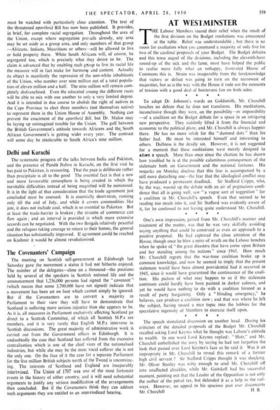The Covenanters' Campaign
The meeting on Scottish self-government at Edinburgh last Saturday gave the movement a status it had not hitherto enjoyed. The number of the delegates—close on a thousand—the positions held by several of the speakers in Scottish national life and the announcement that 1,236,000 persons had signed the " covenant " (which means that some 3,700,000 have not signed) indicate that a movement has been set on foot which cannot simply be ignored. But if the Covenanters are to convert a majority in Parliament to their view they will have to demonstrate that Scotland is suffering more serious injustice than she appears to be. As it is, all measures in Parliament exclusively affecting Scotland go direct to a Scottish Committee, of which all Scottish M.P.s are members, and it is very rarely that English M.P.s intervene in Scottish discussions, The great majority of administrative work is carried out from the Government offices in Edinburgh. It is undoubtedly the case that Scotland has suffered from the excessive centralisation which is one of the chief vices of the nationalised industries, but while she may be the most vocal sufferer she is not the only one. On the face of it the case for a separate Parliament for the five million British subjects north of the Tweed is unconvinc- ing. _ The interests of Scotland and England are inseparably intertwined. The Union of 1707 was one of the most fortunate events in the history of either country, and it will need substantial arguments to justify any serious modification of the arrangements then concluded. But if the Covenanters think they can adduce such arguments they are entitled to an unprejudiced hearing.










































 Previous page
Previous page